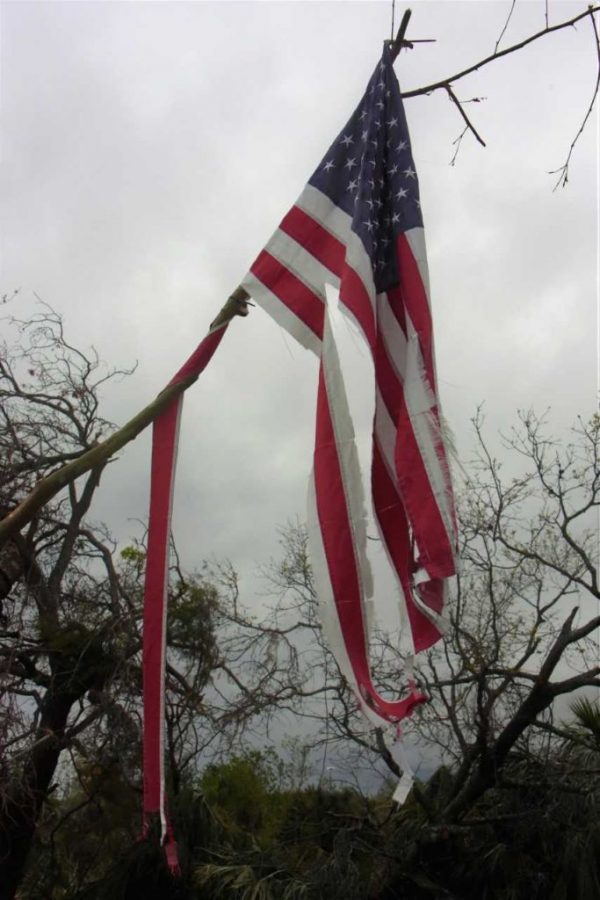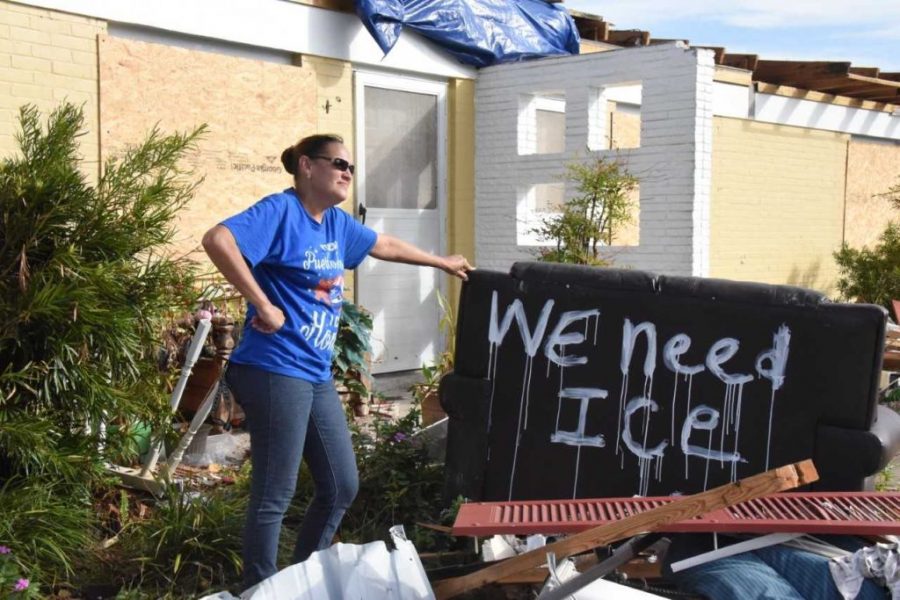Hurricane Michael and a Swarm of Hornets
November 8, 2018
Trinity teacher Mr. Chad Waggoner introduced his account of his trip to Florida to help provide relief for those suffering from the damage inflicted by Hurricane Michael with the following:
Folks –
Trinity, once again, did amazing work. In a matter of days, our community donated enough items to fill an entire 16-foot box truck that I delivered to Jinks Middle School in Panama City, Fla. The gratitude they had in regards to our generosity was overwhelming for them. Several of their teachers are staying with other teachers, as they lost their homes. As a community, we were able to donate clothes, bedding, towels, hygiene items, school supplies, classroom sets of books, backpacks, flashlights, batteries, home good items, and so much more. Jinks was touched and moved that a school 10 hours away would be willing to give so much.
So, thank you for the support. Also, we had terrific partners with Christian Academy, which donated items, and Sternberg Truck and Van Rental, which gave us the truck for free from Thursday through yesterday.
The story of Hurricane Michael is not over, and I promised those that I met I would share their stories. They ask that you keep them in your prayers. They have years of cleaning and then rebuilding in front of them.
If you have a couple minutes, please read their story that I witnessed below.
Thanks again,
Chad
Tiff Brown surveys the damage to the Jinks Middle School library that she has spent the past decade building and designing (often using her own money). As the school’s librarian, she had been purchasing used couches, chairs, and décor to create a sense of home for her students. Considering that the school is a Title 1 school with 100 percent of its students on free lunch, it was important for Tiff to give a place to her students to feel like home, decompress, and have a safe spot during and after the school day.
But now everything is different. Hurricane Michael destroyed homes, businesses, hospitals, churches, and schools. Panama City is littered with debris. Street signs are bent and often pointing the wrong direction. Power lines lay across roads and sidewalks. Trees that once stood strong are now broken, splintered, and fallen without any green. Homes, if they are standing, are covered with blue tarps. Water-soaked furniture and piles of trash line neighborhood streets. The city is a patchwork of broken brown trees and blue tarp-covered homes with mountains of broken memories.
Jinks’s library reflects the outside. The carpet was soaked from the hurricane and therefore removed, leaving behind a brown subfloor. The books on the shelves are covered with tarps. Tiff Brown sadly reveals, “I just wanted them (her students) to have something left normal. Something that wasn’t touched by Michael. But there is no normal. This is our new normal… and there is now just so much brown.”
COMING HOME AFTER THE STORM
Tiff and her family evacuated Panama City with the approaching storm, traveling an hour north inland at Marianna, Fla., to her childhood home to stay with her parents; however, as Michael continued to grow in power, they realized her childhood home was in the path so they escaped to a friend’s in north Alabama. Once Michael was gone, her family began to feel the anxiety of returning home to the unknown. Discovering water which had been chest high in her house and the roof was gone was overwhelming. Her daughter asked how long it would be before their home could be fixed. Brown said she could only answer “the home we knew is gone.”
Her neighborhood was gone as well, though. With the trees gone, some of the homes gone, geographical landmarks gone, and street signs gone (or at least bent and pointing in directions that do not even face a road), she said driving through the neighborhood is so much more difficult. Brown described an instance in which her husband literally got lost two streets over driving to a friend he had driven to numerous times before. Then she added, “Another time when we came back from church, we passed by our neighborhood because we no longer recognize our neighborhood.”
Meanwhile, as she was discovering her family’s loss in Panama City, she received a call from her father, who shared that the home she grew up in was damaged. That the woods she played in as a child were no longer there. That the acres and acres of trees had nothing left. For Brown, losing her house and her “home” due to the same storm was difficult to understand.
Then the librarian went into school. She had seen the national news coverage with the drone footage of the devastation to the gym, but walking into the library, she emotionally recalled, was, “Strike three. My house. My home. And now this? Not this, too. Not this, too.”
REBUILDING THE HIVE
Michael Perry, the assistant principal of Jinks, is working on the logistics of how to start school again. The gym is gone. Classrooms are damaged. Computers are missing due to vandals or broken from storm destruction. He has staff that have no homes. He has transformed one of his classrooms into a daycare for his teachers and staff since the daycares were wiped out. He does not even know if his students are still in town, as most of them have lost their homes. Their phones do not work. Emails are bounced back. Most in the area do not have power or WiFi. He is praying that when they open the doors on Monday that those who can make it will be there. The school is expecting to have only 200 of the 600 Jinks Hornets show up.
Additionally, his school facilities are being used for another school as well. Bay High School, which Jinks is a feeder school for, suffered so much damage that Jinks will host Bay High from 7 a.m. until noon and then begin with Jinks students at 1 p.m., who will go through 6 p.m. Perry has been busy in partnering Bay High teachers with Jinks teachers so they can collaborate with classrooms, creating keys for the Bay teachers and ordering some temporary classrooms, which will be placed on Jinks athletic fields. With no gym or athletic fields, he still does not have an answer on what to do for either school’s athletic teams. But Perry has hope and is proud of how his faculty are determined to “Rebuild the Hive.”
BEING BLESSED
Kathy Roberts, of Trinity Lutheran Church down the street from Jinks, leads a food pantry out of the church’s fellowship hall for neighbors of the church. Roberts feels blessed that she can lead the church’s outreach mission since her job at the hospital in which she is a nurse is closed due to Michael’s destruction. Although she is without a job, the pantry gives her a sense of purpose. Although her own house suffered damage, she is finding her faith strengthened by providing food for her neighbors that lost so much more.
However, some of the first responding groups offering food to the community are beginning to pack up and leave since their volunteers are returning home after weeks of service; her church’s pantry have been the beneficiary of those that were closing shop. “With these other groups leaving, they have been giving us and the other local pantries their food, which we have been able to use for those in our neighborhoods. But it means less neighborhoods are having options.”
IT HURTS MORE NOW
Jacqueline Trabal was sifting through the debris around her home trying to find what she could savage. Her home still does not have power, so she painted “We need ice please” on a reclining chair that sits in her front yard, along with other furniture that was destroyed when the water came into her home. She shares she is depressed and is struggling with anxiety that came from staying in her home during the storm. Trabel recalled how she and her boyfriend took shelter in her bathroom during the three hours Michael was tearing apart her house. She still hears the sounds of her house falling apart around her. She still feels the effects that she believed she was going to die during Michael.
Trabel looks at her belongings lying in a trash pile and quietly acknowledges, “I don’t have anything left, but God blessed me. I am alive. I don’t have anything left, but I am here, and I know He has a plan.” She then shares, though, that the pain hurts more now. Living with the post stress of the storm is terrifying. As she picks up a stepping stone from her garden, she shares that a check she had received from FEMA for $468 for everything she owns actually hurt more than it helped, but concludes, “But I am alive and for that I am thankful.”
SOMETHING GREATER
Tiff Brown found that although the storm took away so much from so many, Michael also has given something greater to Panama City. “I now know neighbors by their first name that I had never met before. The storm has forced us to know our neighbors, and we look out for each other. I have made new strong friendships because of the storm.”
Brown also believes that her library will be bigger and greater than prior to the storm. Hurricane Michael has brought Bay High together with Jinks Middle, and Brown has already began to collaborate with the Bay art teacher. They plan on having the Bay art students paint a mural that will bring in much needed color to the currently brown library, as well as a powerful tool of healing for the students. Brown herself plans on having all of her Jinks students write on the library’s subfloor their thoughts of survival and rebuilding the hive. Then in time, when the school is able to replace the carpet, those students’ thoughts will forever be a part of the library.
Brown sees so much good that has come from Michael for her community. She, too, has hope like Michael Perry, Kathy Roberts, and Jacqueline Trabal. But she also pleads, “We know there are other news stories. We know that there are stories that have to be told. But our lives, ‘our normal’ does not end when you turn off the television. This is our normal. Don’t forget about us.”



